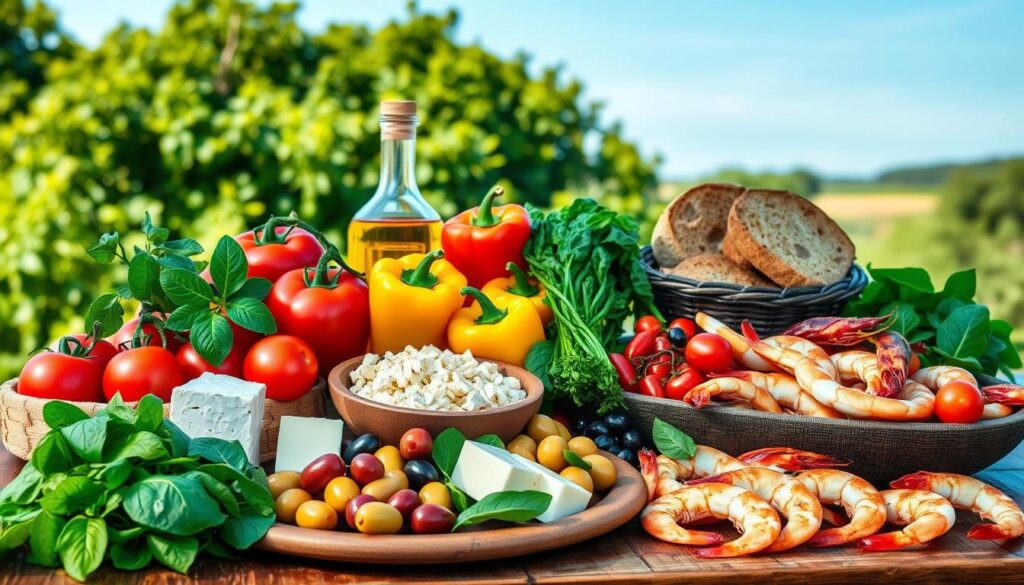Are you curious about the Mediterranean diet and its promise of better health and weight control? This ancient eating style has won over health fans around the world. It’s because it offers a path to longer life, better heart health, and lasting weight loss. Get ready to learn about the amazing benefits of the Mediterranean diet.
Key Takeaways
- The Mediterranean diet is a holistic approach to healthy eating, embracing a lifestyle of delicious, nutrient-rich foods and active living.
- This dietary pattern has been linked to remarkable health benefits, including reduced risk of heart disease, improved brain function, and effective weight management.
- Understanding the core principles and traditional Mediterranean food culture is crucial for successfully incorporating this diet into your daily routine.
- Incorporating the right balance of healthy fats, plant-based foods, seafood, and moderate wine consumption can transform your overall well-being.
- Adopting smart strategies for meal planning, portion control, and exercise integration can help you achieve your weight loss goals with the Mediterranean diet.
Understanding the Mediterranean Diet Principles
The Mediterranean diet is more than just food. It’s a lifestyle that comes from the Mediterranean Sea’s countries. It’s about healthy habits and enjoying good food. Let’s dive into what makes it so good for your body and mind.
Traditional Mediterranean Food Culture
The Mediterranean diet values fresh, seasonal foods and sharing meals. It’s about enjoying food with loved ones. This tradition comes from places like Greece and Italy, where nature and culture meet.
Key Components and Lifestyle Factors
- Abundant use of olive oil, a hallmark of Mediterranean cuisine and a rich source of healthy fats
- Emphasis on plant-based foods such as fruits, vegetables, whole grains, and legumes
- Moderate consumption of fish, poultry, and dairy products
- Limited intake of red meat and processed foods
- Regular physical activity and active lifestyle
- Importance placed on social interactions and shared mealtimes
Modern Adaptations and Implementation
The Mediterranean diet’s core has stayed the same, but it’s evolved for today’s health seekers. It blends traditional wisdom with modern ease. This way, we can enjoy its benefits in our fast-paced lives.

“The Mediterranean diet is not just a diet – it’s a lifestyle that encompasses the joy of shared meals, the importance of physical activity, and the cultivation of meaningful social connections.”
Essential Foods in the Mediterranean Diet
The Mediterranean diet is filled with delicious, whole foods. It includes vegetables, fruits, olive oil, and fish. These foods are the heart of this diet. Let’s explore what makes it so tasty and healthy.
Abundant Produce
The diet focuses on vegetables and fruits. Think of tomatoes, greens, peppers, citrus, and berries. These foods are full of vitamins, minerals, and fiber. They also add flavor to every meal.
Whole Grains and Legumes
Whole grains like wheat, brown rice, and quinoa are key. They give you energy and a good texture. Legumes like chickpeas, lentils, and beans add protein.
Heart-Healthy Fats
Olive oil is central to Mediterranean cooking. It’s known for its health benefits and taste. Other healthy fats, like in nuts and fatty fish like salmon, are also important.
| Mediterranean Diet Essentials | Health Benefits |
|---|---|
| Vegetables, Fruits, Whole Grains, Legumes | Fiber, Vitamins, Minerals, Antioxidants |
| Olive Oil, Nuts, Fatty Fish | Healthy Fats, Anti-Inflammatory Properties |
By using these whole foods, the Mediterranean diet offers a balanced and tasty way to eat. Adding these foods to your meals can make a big difference in your health.

The Science Behind Mediterranean Diet Benefits
The Mediterranean diet is not just tasty; it’s also scientifically proven. It’s a plant-based diet that’s good for your heart and brain. It offers many health benefits, from better heart health to improved brain function.
Cardiovascular Health Improvements
This diet helps your heart by lowering the risk of heart disease and stroke. It can also lower blood pressure and improve cholesterol levels. These changes are key to a healthy heart.
Anti-inflammatory Properties
The Mediterranean diet is full of anti-inflammatory foods like olive oil, nuts, and fatty fish. These foods help reduce body inflammation. This can protect against heart disease, some cancers, and even brain decline.
Brain Health and Cognitive Function
Research shows the Mediterranean diet is good for your brain too. It’s packed with healthy fats, antioxidants, and anti-inflammatory compounds. These can improve memory, problem-solving skills, and lower the risk of Alzheimer’s.
By following the Mediterranean diet, you can enjoy many health benefits. From a healthier heart to a sharper mind, it’s a winning choice. Try it out and see the science-backed advantages for yourself.
Healthy Fats and Olive Oil Benefits
The Mediterranean diet focuses on healthy fats, especially olive oil. This liquid gold is key to the diet’s success. Fats are not bad; they can actually make you feel better and more energized.
Olive oil is a mainstay in Mediterranean cooking. It’s full of monounsaturated fatty acids. These fats can lower heart disease risk, improve cholesterol, and help with weight.
- Olive oil has oleic acid, a healthy fat that fights inflammation.
- Its antioxidants, like polyphenols, protect cells and support health.
- Using olive oil in meals can help you feel full longer, aiding in weight loss.
Olive oil is the cornerstone of the Mediterranean diet and a key to unlocking its many health benefits.”
The Mediterranean diet also includes other healthy fats like nuts, seeds, and fatty fish. These fats are rich in nutrients, boost brain function, and lower disease risk. Adding healthy fats to your diet is a big step towards better health.
Plant-Based Foods and Their Role
In the Mediterranean diet, plant-based foods are key. They offer lots of nutrients and health benefits. From colorful veggies and fruits to legumes and whole grains, these foods are the base of this diet.
Vegetables and Fruits Guide
Vegetables and fruits are the heart of the Mediterranean diet. Try a variety like leafy greens, tomatoes, and peppers. Also, enjoy seasonal fruits and try new foods like artichokes and figs.
These foods are full of fiber, vitamins, and antioxidants. They help nourish your body.
Legumes and Whole Grains
- Legumes, like chickpeas and lentils, are key in the Mediterranean diet. They’re packed with protein, carbs, and fiber. This keeps you full and happy.
- Whole grains, like brown rice and quinoa, are also important. They give you energy and lots of nutrients.
Herbs and Spices Usage
Herbs and spices are vital in Mediterranean cooking. They add flavor and health benefits. Use oregano, basil, and cinnamon to make your food taste great and be good for you.
Adding lots of plant-based foods to your diet is great. You’ll get a variety of nutrients and health benefits. Enjoy the flavors and health perks of eating this way.
Fish and Seafood in Mediterranean Eating
Fish and seafood are the main attraction in the Mediterranean diet. They are packed with nutrients and offer many health benefits. Let’s explore how you can add these ocean treasures to your meals.
The Mediterranean is known for its high-quality fish. You’ll find everything from flaky cod to vibrant salmon. These fish are not just tasty but also rich in omega-3 fatty acids. These acids are good for your heart, brain, and overall health.
Variety is the Spice of Life
With the Mediterranean diet, it’s all about variety. Here are some top fish and seafood picks:
- Sardines – Rich in omega-3s and a great source of protein
- Tuna – A versatile fish that can be enjoyed grilled, baked, or in salads
- Shrimp – Packed with vitamins and minerals, shrimp are a quick and easy addition to any meal
- Mackerel – An oily fish bursting with omega-3 fatty acids and a delicious flavor
- Mussels – Low in calories and high in nutrients, mussels are a Mediterranean staple
Try to eat a variety of fish and seafood. This ensures you get a range of nutrients and flavors.
Reaping the Benefits
Eating fish and seafood regularly is good for you. They are full of omega-3 fatty acids. These acids can help lower heart disease risk, reduce inflammation, and improve brain function.
So, whether you’re grilling tuna steak, sautéing shrimp, or enjoying mussels in broth, you’re making a healthy choice. Embrace the Mediterranean’s sea-inspired flavors and make these foods a part of your healthy lifestyle.
Weight Loss Success with Mediterranean Diet
Looking to lose a few pounds? The Mediterranean diet could be your answer. It’s not just for weight loss. It also builds healthy habits for the long run.
Portion Control Strategies
Mastering portion control is key to losing weight with the Mediterranean diet. Don’t deprive yourself. Instead, fill your plate with foods that are good for you. Choose smaller portions of protein, healthy fats, and complex carbs. Eat more vegetables and fruits to stay full without eating too much. Listening to your body and eating slowly can also help you control your portions.
Meal Planning Tips
- Plan your meals ahead to avoid bad choices. Prepare ingredients early for quick meals.
- Make sure your meals include a variety of vegetables, legumes, whole grains, and lean proteins. This keeps your diet interesting and healthy.
- Enjoy your food in moderation and with others. Savor each bite and avoid eating mindlessly.
Exercise Integration
Regular exercise is important with the Mediterranean diet. Do a mix of cardio, like walking or swimming, and strength training to build muscle and increase your metabolism. Start slowly and increase your workouts to make exercise a regular part of your life.
| Mediterranean Diet Weight Loss Tips | Benefits |
|---|---|
| Portion Control | Prevents overeating, promotes satiety |
| Meal Planning | Ensures balanced, nutrient-dense meals |
| Exercise Integration | Boosts metabolism, builds muscle, improves overall health |
The Mediterranean diet is more than just for losing weight. It’s a way of life that nourishes your body, mind, and soul. By following these tips, you’ll be on your way to lasting weight loss success.
Getting Started: Mediterranean Diet Meal Plan
Ready to try the Mediterranean diet for better health and weight loss? We’ve got a step-by-step guide for you. Learn how to make a great grocery list and master meal prep. This plan will help you succeed with the Mediterranean diet.
Build Your Grocery List
Before you go shopping, plan ahead. Start by listing the key Mediterranean diet foods:
- Extra virgin olive oil
- Nuts and seeds
- Whole grains like quinoa and brown rice
- Variety of fresh fruits and veggies
- Lean proteins like fish, chicken, and legumes
- Herbs and spices to flavor your dishes
Meal Prep Like a Pro
Meal prep is crucial for sticking to a Mediterranean diet meal plan. Spend a few hours on the weekend cooking healthy meals for the week. Some good options include:
- Roasted Mediterranean vegetable medley
- Meal prep Mediterranean chicken and quinoa bowls
- Lentil and whole grain salad with feta and olives
With some planning and prep, you’ll be on your way to Mediterranean diet success!
“The Mediterranean diet is not a diet, it’s a lifestyle. It’s about enjoying fresh, wholesome foods and the company of loved ones.
Common Mistakes to Avoid
Starting a new diet can be thrilling, but it’s key to avoid common mistakes. We’ll guide you through shopping errors and dining out challenges. Our tips will help you stay on track with your Mediterranean diet goals.
Shopping Guidelines
When buying for your Mediterranean diet, read labels closely. Avoid foods with added sugars, unhealthy fats, and too much sodium. Shop the grocery store’s edges for fresh produce, whole grains, and lean proteins.
Plan your meals and make a shopping list to avoid impulse buys. This way, you’ll stick to your diet plan.
Food Preparation Tips
Learning to cook Mediterranean-style is easy. Use gadgets like food processors or air fryers to make quick, healthy meals. Add flavor with herbs and spices instead of salt or unhealthy additives.
Dining Out Strategies
Eating out can be part of a healthy Mediterranean lifestyle. Choose grilled or baked seafood and vegetable dishes. Opt for olive oil-based dressings instead of creamy or saucy ones.
Customize your order to fit your diet. This way, you can enjoy dining out without straying from your goals.






72 Comments
[…] with stevia, monk fruit, maple syrup, and honey. These natural sweeteners add great flavors and health benefits. Discover how to use them to make your drinks […]
[…] legumes, including beans, peas, lentils, and […]
[…] standard serving sizes is the first step in portion control. A typical serving size is usually a set amount, […]
[…] excited to support you as you reach fasting milestones. This approach to eating can bring amazing health and weight benefits. Here’s to your success – let’s achieve it […]
[…] Food allergy testing is crucial for identifying your specific triggers and managing your diet and health. […]
[…] overly restrictive diets. Eliminating many foods risks nutritional deficiencies. Some people report weight loss, fatigue, or disordered eating […]
[…] Let’s explore what makes our app special. Better than Food is Good isn’t just a claim—it’s a promise we keep with every action6. Unlike most food apps, we change how you see nutrition and meal planning. […]
[…] of life. It’s about eating well and meeting our needs without hurting others3. Vegans choose plant-based foods that are good for the planet and all living […]
[…] different vegan dishes is another exciting part. Students get to taste a wide range of plant-based foods. They also get feedback from teachers and friends, helping them improve their […]
[…] Leafy greens, nuts, whole grains […]
[…] Health Benefits […]
[…] Medical and nutritional research supports moderate chestnut consumption for heart health. […]
[…] with legume allergies (including peanuts, soy, and other beans) are at risk and should avoid recalled […]
[…] research explores the health impacts of high-protein and egg-centric diets in omakase […]
[…] Allergy and Clinical Immunology, researchers conducted a large-scale analysis of pregnant women’s diets and their children’s health outcomes. The study, highlighted by MSN, found that regular consumption of yogurt—a staple of the […]
[…] with many more managing intolerances or adhering to vegetarian, vegan, gluten-free, or low-FODMAP diets for health or ethical […]
[…] Weight loss doesn’t have to be complicated or time-consuming. As highlighted by GB News and supported by recent scientific research, a 10-minute daily workout can deliver real results—especially when paired with personalized nutrition from Food Scan Genius. […]
[…] Plant-Based Food Stalls: Sample a diverse range of vegan cuisine, from gourmet burgers and curries to decadent desserts and artisanal cheeses. […]
[…] Balanced Meals: Ensure your diet includes a variety of plant-based proteins, whole grains, fruits, and vegetables to avoid nutritional […]
[…] about the benefits of choosing sulfite-free wines for your […]
[…] cover the health and environmental benefits of growing your own food. You’ll learn practical techniques to create a chemical-free oasis. […]
[…] immune system. Clean eating gives us vital nutrients and antioxidants. Adding more fruits, veggies, whole grains, and lean proteins to our meals boosts our […]
[…] power-packed plant-based foods that protect your […]
[…] studies have shown that a well-planned vegan diet can provide a wealth of health benefits. Vegans often experience lower risks of chronic diseases, such as heart disease, type 2 diabetes, […]
[…] meals are made from a variety of plant-based foods. These include fruits, veggies, grains, legumes, nuts, and seeds2. These foods are packed with […]
[…] Omega-3 enriched fish fillets to support heart health. […]
[…] check for allergens. It shows detailed nutrition facts. This helps you choose foods that fit your diet and health goals. Plus, it offers personalized food suggestions just for […]
[…] planning can be tough for families with allergies. We can make it easier by creating allergen-free meal plans for everyone. Planning meals for 3-5 days can save time on shopping and cooking. Let’s make […]
[…] long-term weight loss. We’ll look at the metabolic and hormonal factors that affect weight loss. And, we’ll share the key principles of successful weight loss plans. Say goodbye to yo-yo […]
[…] diet. But, there are many plant-based foods that offer plenty of protein. Legumes, nuts, seeds, and whole grains are great […]
[…] This guide explores the world of organic food. We’ll look at what makes it special, its health benefits, and how to choose the best for your […]
[…] know nutrition is about more than tracking. It’s about making lasting, personal meal plans. Food Scan Genius works with top meal planning services to give smart dietary advice. Our approach […]
[…] on balanced nutrition is critical — see our nutrition […]
[…] Scientific research supports raw-style frozen diets for better skin and coat health. […]
[…] Greek yoghurt’s lower carbohydrate content makes it more keto-friendly. A 150g serving can fit easily into low-carb macros, whereas dahi’s higher carbs may require portion control. […]
[…] find both low-fat vs low-carb can yield similar weight loss when calories […]
[…] in monounsaturated fats, fiber, and micronutrients, avocados support heart health and weight […]
[…] Keto and Low-Carb Diets: Peanuts are relatively low in carbohydrates and high in healthy fats, fitting well into ketogenic meal plans. […]
[…] recommend balanced diets rich in whole grains, fruits, vegetables, and lean proteins. According to the CDC’s nutrition guidelines, diets high […]
[…] leafy greens, fortified plant milks, and legumes to boost calcium and vitamin […]
[…] Promotes weight loss […]
[…] Your Protein Sources: Combine legumes, grains, seeds, and nuts for a complete amino acid […]
[…] rainbow diet can benefit vegetarians, vegans, flexitarians, and omnivores alike. By focusing on color groups rather than […]
[…] Ongoing research supports Mediterranean eating for heart and metabolic health. […]
[…] research from the Centers for Disease Control and Prevention (CDC) suggests minimal weight-loss benefits when diet sodas replace sugar-sweetened beverages without broader lifestyle […]
[…] Leafy greens, nuts, whole grains […]
[…] a variety of vegetables, seeds (like chia or flax), and legumes such as chickpeas to boost fiber. Aim for at least 7–10 grams of fiber per […]
[…] in cellular agriculture and plant-based foods are at the forefront of a sustainable, animal-friendly food revolution. Tools like Food Scan Genius […]
[…] with legume allergies (including peanuts, soy, and other beans) are at risk and should avoid recalled […]
[…] research supports benefits for heart health and weight […]
[…] through last-mile delivery. Disruptions can reduce colony-forming units (CFUs), diminishing health benefits. This underscores the importance of an optimized Asia Pacific refrigerated transport market for […]
[…] wheat protein with legumes to balance amino acid […]
[…] Food Prices: The cost of fresh fruits, vegetables, whole grains, and lean proteins has increased by over 15% since 2023, according to the British Retail […]
[…] Snacking: Carry portable snacks like trail mix, roasted chickpeas, dried fruits, and whole grain crackers to avoid unhealthy airport or roadside […]
[…] studies underscore the importance of allergy-friendly, plant-based food […]
[…] How important is sleep in weight loss? […]
[…] shows that over 32 million Americans have food allergies, and millions more follow specialized diets for health or ethical […]
[…] of my nut allergy. Now, I just scan and go. The app even suggests recipes I can actually eat. Weight loss has never been this easy.” — Priya, 29, […]
[…] you’re considering skipping breakfast or adopting other unconventional habits for weight loss, keep these expert tips in […]
[…] benefit: The shift also led to lower levels of inflammation and improved gut health, both of which are linked to […]
[…] chicken soup due to mislabeling and undeclared allergens. The product, labeled as “chicken with whole grain pasta,” actually contained a different soup with milk and wheat, posing a serious risk to those […]
[…] Meal Planning: Generate meal plans tailored to prostate health that account for individual sensitivities and […]
[…] Nutrition: Gujarati cuisine is rich in lentils, vegetables, whole grains, and spices, providing a balanced mix of protein, fiber, and essential […]
[…] Health: Recent research (Smith et al., 2024, Journal of Adolescent Health) highlights the mental health benefits of strength training, including reduced anxiety and improved self-esteem among […]
[…] Whole Grains: Fiber-rich foods that support digestive health and lower colorectal cancer risk. […]
[…] not all vegan products are created equal. Many processed plant-based foods contain additives, gluten, soy, or other potential allergens. For people with multiple food […]
[…] it’s heart-healthy: Olive oil is the cornerstone of the Mediterranean diet. It’s rich in monounsaturated fats, which help lower LDL (“bad”) cholesterol and increase HDL […]
[…] renowned medical expert, emphasizes that fiber is the “one thing” everyone should add to their diet for better gut health and cancer […]
[…] recognized globally for their high-quality protein content, essential amino acids, and functional health benefits. Unlike many plant proteins, soy is a complete protein, providing all nine essential amino acids […]
[…] Plant-Based Foods: Focus on fruits, vegetables, legumes, and whole grains, which are rich in antioxidants and phytochemicals known to protect against […]
[…] Whole, Minimally Processed Foods: Fresh fruits, vegetables, whole grains, lean proteins, and homemade meals are the healthiest […]
[…] bonus reflects organic products’ health benefits. These products avoid chemical pesticides that might pose health risks [9]. Products need […]